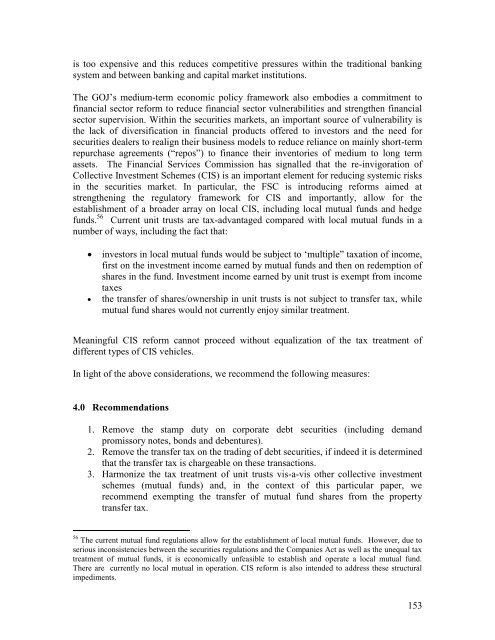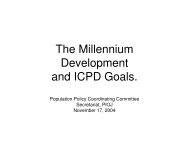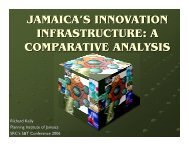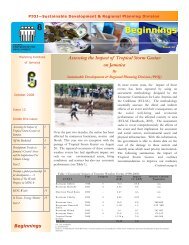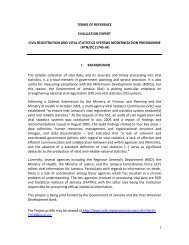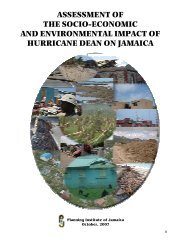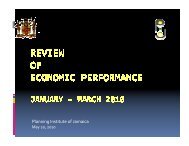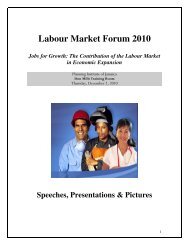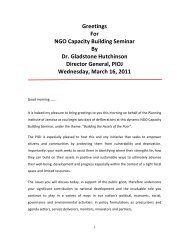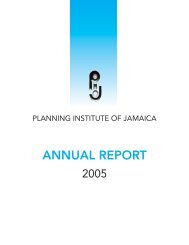PIOJ Growth-Inducement Strategy - Planning Institute of Jamaica
PIOJ Growth-Inducement Strategy - Planning Institute of Jamaica
PIOJ Growth-Inducement Strategy - Planning Institute of Jamaica
You also want an ePaper? Increase the reach of your titles
YUMPU automatically turns print PDFs into web optimized ePapers that Google loves.
is too expensive and this reduces competitive pressures within the traditional banking<br />
system and between banking and capital market institutions.<br />
The GOJ’s medium-term economic policy framework also embodies a commitment to<br />
financial sector reform to reduce financial sector vulnerabilities and strengthen financial<br />
sector supervision. Within the securities markets, an important source <strong>of</strong> vulnerability is<br />
the lack <strong>of</strong> diversification in financial products <strong>of</strong>fered to investors and the need for<br />
securities dealers to realign their business models to reduce reliance on mainly short-term<br />
repurchase agreements (“repos”) to finance their inventories <strong>of</strong> medium to long term<br />
assets. The Financial Services Commission has signalled that the re-invigoration <strong>of</strong><br />
Collective Investment Schemes (CIS) is an important element for reducing systemic risks<br />
in the securities market. In particular, the FSC is introducing reforms aimed at<br />
strengthening the regulatory framework for CIS and importantly, allow for the<br />
establishment <strong>of</strong> a broader array on local CIS, including local mutual funds and hedge<br />
funds. 56 Current unit trusts are tax-advantaged compared with local mutual funds in a<br />
number <strong>of</strong> ways, including the fact that:<br />
<br />
<br />
investors in local mutual funds would be subject to ‘multiple” taxation <strong>of</strong> income,<br />
first on the investment income earned by mutual funds and then on redemption <strong>of</strong><br />
shares in the fund. Investment income earned by unit trust is exempt from income<br />
taxes<br />
the transfer <strong>of</strong> shares/ownership in unit trusts is not subject to transfer tax, while<br />
mutual fund shares would not currently enjoy similar treatment.<br />
Meaningful CIS reform cannot proceed without equalization <strong>of</strong> the tax treatment <strong>of</strong><br />
different types <strong>of</strong> CIS vehicles.<br />
In light <strong>of</strong> the above considerations, we recommend the following measures:<br />
4.0 Recommendations<br />
1. Remove the stamp duty on corporate debt securities (including demand<br />
promissory notes, bonds and debentures).<br />
2. Remove the transfer tax on the trading <strong>of</strong> debt securities, if indeed it is determined<br />
that the transfer tax is chargeable on these transactions.<br />
3. Harmonize the tax treatment <strong>of</strong> unit trusts vis-a-vis other collective investment<br />
schemes (mutual funds) and, in the context <strong>of</strong> this particular paper, we<br />
recommend exempting the transfer <strong>of</strong> mutual fund shares from the property<br />
transfer tax.<br />
56 The current mutual fund regulations allow for the establishment <strong>of</strong> local mutual funds. However, due to<br />
serious inconsistencies between the securities regulations and the Companies Act as well as the unequal tax<br />
treatment <strong>of</strong> mutual funds, it is economically unfeasible to establish and operate a local mutual fund.<br />
There are currently no local mutual in operation. CIS reform is also intended to address these structural<br />
impediments.<br />
153


